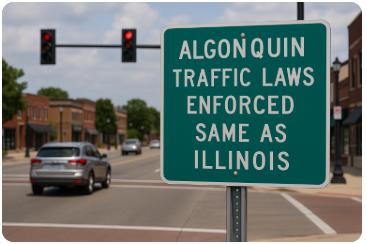1. Introduction
When you’re driving through the Village of Algonquin, Illinois, you might wonder: “Are traffic laws of Algonquin the same as Illinois?” While most people assume all rules on the road are uniform statewide, there are unique local ordinances that may surprise you. This guide dives deep into the similarities and differences between Algonquin’s traffic laws and the broader Illinois Vehicle Code. Whether you’re a local resident or just passing through, understanding these nuances can help you avoid costly tickets and confusion on the road.
2. Legal Framework
To understand how traffic rules are enforced in Algonquin, it’s important to look at the legal foundation.
2.1 Illinois Vehicle Code
The Illinois Vehicle Code (625 ILCS 5/) serves as the comprehensive state-wide framework for traffic laws. It governs everything from DUI offenses, right-of-way rules, vehicle equipment standards, and even pedestrian responsibilities. Every municipality in Illinois, including Algonquin, must comply with these core laws.
2.2 Algonquin Municipal Code
However, local governments like Algonquin have the power to create additional ordinances, provided they don’t conflict with the state law. In fact, Algonquin’s Municipal Code under Chapter 41 directly incorporates large portions of the Illinois Vehicle Code. This means that, on the surface, the laws appear the same, but deeper inspection reveals key local variations that drivers should know.
3. Comparative Analysis: Core Traffic Rules
Let’s answer the core question—are traffic laws of Algonquin the same as Illinois? In general, yes—but with exceptions. The major rules are consistent across the state, but specific implementations can differ.
3.1 Speed Limits
In Illinois:
- Urban areas usually have a 30 mph speed limit.
- School zones are capped at 20 mph when children are present.
- Rural roads may have higher limits, up to 55 mph.
In Algonquin:
- Residential neighborhoods often enforce stricter 25–30 mph zones.
- Certain streets, especially near downtown and schools, use signs to enforce speed reductions.
Algonquin also uses speed-monitoring trailers and temporary electronic signage to warn or cite drivers.
3.2 Right-of-Way and Lane Usage
Across Illinois, the right-of-way rules apply uniformly:
- Yield to pedestrians at crosswalks.
- Yield when merging or at yield signs.
- Follow traffic signals and signs.
Algonquin follows these laws strictly but has installed specific local signage and roundabouts that require more caution and sometimes confuse non-locals. Knowing where to stop or yield in these areas is essential.
3.3 Turning Rules and Signal Use
Both Illinois and Algonquin require:
- Signal at least 100 feet before turning.
- Use the left lane for left turns and right lane for right turns.
- Come to a full stop before turning on red (if permitted).
However, certain intersections in Algonquin have restricted turn hours (especially near Randall Road and Algonquin Commons), which aren’t common in every Illinois town.
3.4 Pedestrian and Cyclist Rules
The state law mandates:
- Vehicles must yield to pedestrians at marked and unmarked crosswalks.
- Cyclists have the same rights and responsibilities as motor vehicles.
Algonquin goes a step further by:
- Prohibiting bicycles on sidewalks in certain zones.
- Providing separate bike lanes in high-traffic areas.
3.5 Scott’s Law
Both Algonquin and the entire state strictly enforce Scott’s Law—requiring drivers to move over for emergency vehicles with flashing lights. Failing to do so can result in fines up to $10,000 and potential license suspension.
4. Local Specifics: Algonquin-Only Ordinances
While most traffic regulations match Illinois law, Algonquin enforces several unique rules under its municipal code.
4.1 Parking Regulations
Algonquin sets local rules that differ from state norms:
- Two-Hour Parking Limit: Especially in the downtown/Main Street area.
- Overnight Parking Ban: Common during winter to facilitate snow removal.
- Restricted Parking for Commercial Vehicles: These cannot park in residential zones without a permit.
| Rule Type | Algonquin Implementation |
|---|---|
| Downtown Parking | 2-hour limit |
| Overnight Parking | Prohibited (November–March) |
| Boat Trailer Parking | Requires special permit |
| Handicap Zones | Strict enforcement, fines start at $250 |
4.2 Automated Enforcement
Some intersections in Algonquin use red-light cameras and speed detection systems. Though allowed statewide, not every city installs these. Fines from such violations are often civil (non-moving) but can still affect insurance and lead to vehicle registration blocks.
4.3 Sidewalk Use by Scooters and Bikes
Electric scooters and motorized bikes are banned from sidewalks in Algonquin. State law is more ambiguous, which is why this local rule matters.
4.4 Street-Specific Restrictions
Certain roads like Algonquin Road or Randall Road have unique no-parking or restricted-turn zones. These don’t conflict with state law but are enforced independently.
5. Crash Reporting & Penalties
5.1 Accident Reporting
According to Illinois law:
- All crashes involving injury or property damage over $1,500 must be reported.
- Drivers must exchange insurance and ID at the scene.
Algonquin police will also file a local report and often send a mailed copy upon request. Delayed reporting can lead to fines or increased liability.
5.2 Penalty Structures
Fines differ based on where the infraction occurs.
| Violation Type | Illinois Fine (Typical) | Algonquin Fine |
| Speeding (10–20 mph over) | $120–$140 | $100–$200 |
| Illegal Parking | $50–$100 | $75–$150 |
| Red-Light Violation | $100 | $100 (Camera zone) |
| DUI | $500–$2,500 + license impact | Same |
Algonquin’s municipal code allows for fine escalation on repeated offenses and may include administrative hearing fees.
6. Tree of Precedence: State vs Local Authority
6.1 Home-Rule Powers
Although Algonquin is not a home-rule municipality, it still can enforce unique traffic regulations under state allowances. These cannot directly conflict with state law but can supplement them.
6.2 Conflict Resolution
If a driver is cited under both a state and local ordinance for the same incident, the state law generally prevails. However, enforcement is local, and police may choose which citation to issue.
6.3 Consistent Zones
Most traffic areas in Algonquin reflect state law directly, such as:
- DUI enforcement
- School zone speed limits
- Seatbelt laws
This consistency ensures drivers don’t face wildly different rules city to city.
7. Practical Takeaways
So, are traffic laws of Algonquin the same as Illinois? Yes—with notable differences. Most foundational laws are identical because they are derived from the Illinois Vehicle Code. However, Algonquin does enforce specific ordinances that go above and beyond state standards.
For drivers, this means:
- Always check local signage, especially in residential or downtown areas.
- Don’t assume statewide rules apply to parking and scooter use.
- Use caution around school zones and red-light camera intersections.
8. Conclusion
In conclusion, the traffic laws in Algonquin largely follow those outlined by the State of Illinois. However, several municipal ordinances provide additional regulations, particularly concerning parking, vehicle types, and enforcement mechanisms. Knowing these differences can help both residents and visitors drive safely and avoid fines.
So, next time you wonder “are traffic laws of Algonquin the same as Illinois?”—you’ll know the answer is yes, but read the signs just in case.
9. Appendices & References
- Illinois Vehicle Code: https://www.ilga.gov/
- Algonquin Municipal Code, Chapter 41: https://www.algonquin.org/
- Algonquin Police Department: https://www.algonquin.org/police
- Scott’s Law Info: https://idot.illinois.gov
Related Articles
Unlocking the Power of Mega-Personal.net Health Archives: A Complete Guide
Explore Acibadem Health Point: Your Trusted Gateway to World-Class Healthcare in Turkey
Lucent Health Provider Portal: Complete Guide for Healthcare Providers
Acccooe Capital Finance: Comprehensive Guide to Its Services, Technology, and Client Benefits

